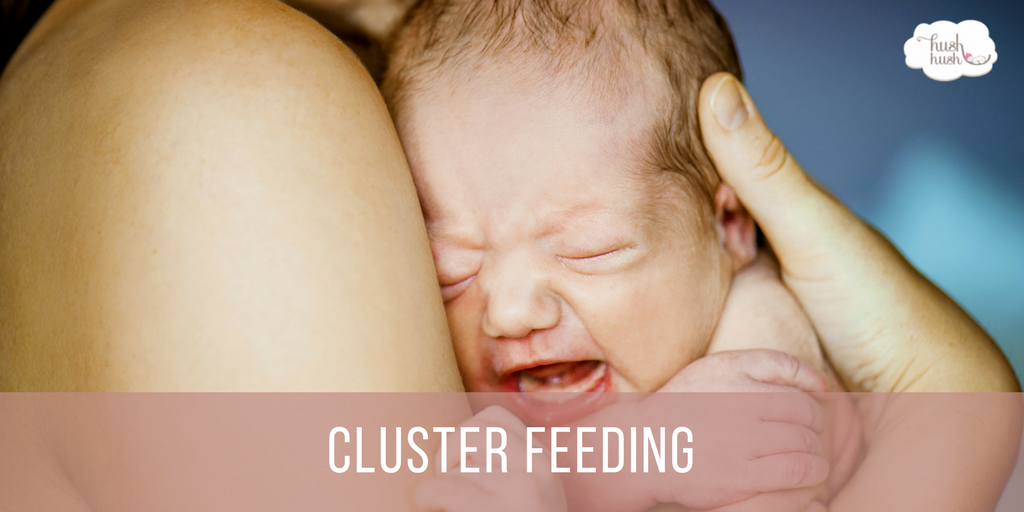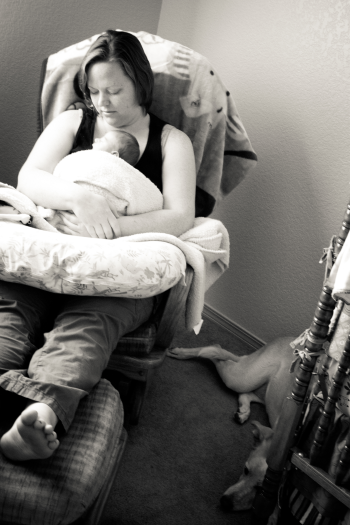I have been teaching prenatal breastfeeding classes for many years. One of the first things we discuss is the benefits of breastfeeding. Parents often have very specific reasons for wanting to breast/chest feed. Whether it’s health benefits for the baby, health benefits for the parent, or any of the other amazing reasons, we agree breastmilk is the best food for babies.
Breastfeeding is not always easy. Parents are unsure if babies are getting what they need to grow or if their milk is nutritious enough. There are always questions. And nothing makes a new parent question breast/ chest feeding like cluster feeds. Parents want to know the truth behind cluster feeding and newborn babies.
What Is Cluster Feeding?
Cluster feeding is just like the name suggests, your baby is eating in clusters. You may have a perfectly content baby for most of the day, but at one point they may want to eat more frequently. Some babies become fussy, show feeding cues, and are not content unless they are on the breast. They may eat several times over the course of a couple of hours (hence the “clusters”). This behavior is not only normal but expected. Unless, of course, you are the new parent, then it takes you by surprise.
I remember experiencing cluster feeding with my babies, especially after my twins were born. I was in the hospital recovering from a cesarean delivery. It was the second night, which is a common time for babies to cluster feed.
One baby would cry so I would put them to the breast. They would suckle a little bit and doze off. Then the other baby would cry, so I would put the first baby down, then latch the other baby. It continued like this for a while. I was alone and couldn’t figure out how to soothe both babies at the same time. It was hard to move around, and as soon as one baby was calm, I would tend to the other, which would make the first baby start to cry again. At one point I was so overwhelmed and felt so helpless I didn’t even know which baby was which. I finally called for a nurse to come help me.
Babies cluster feed for a couple of reasons. We often mistake it completely for hunger, but that is only one reason:

Comfort
Let’s face it, breastfeeding is not only for food. For many parents, the focus of breast/chestfeeding is to give the baby breastmilk. For babies, there are many reasons for them to be at the breast. Breast/chestfeeding is nurturing and calming for babies. It is their safe place. If your baby is overstimulated, scared, or upset, that is where they will feel the most secure. This is not a bad habit starting to form, this is your baby learning attachment and finding security with their parents.

Hunger
Babies may be cluster feeding for comfort at times, but they are absolutely getting milk. You may see cluster feeding happening in the evening, and some experts believe this is the baby’s way to “fill up” and go a little bit longer between feedings at night. Who doesn’t want a longer stretch of sleep?
As I mentioned, we often see cluster feeding happen in the evening. However, cluster feeding can happen at any time. Some babies will cluster feed in the morning if they sleep longer at night. Whenever they do it, it’s ok. Just follow your baby’s lead.
It’s a common concern that if the baby is feeding frequently, the breast/chestfeeding parent doesn’t have enough milk. Babies are not cluster feeding because you don’t have enough milk, they are cluster feeding because they want to be close to you. Frequent feeding will only give your body the message to continue making more milk. Breastfeeding works on a supply and demand system. The more your baby feeds, the more your body will make. So, if your baby is cluster feeding, your body will increase demand. This is why lactation consultants encourage feeding on demand, and that includes the dreaded cluster feeding.
Now that we know what cluster feeding is and why it happens, let’s talk about how to get through it.
Support
Cluster feeding can feel very overwhelming. Sometimes the baby will only want to be with the breast/chestfeeding parent during this time. The important thing to remember is that this doesn’t last forever. Babies outgrow cluster feeding in a couple of months, and before you know it, it’s over. In the meantime, make sure you have some support.
Babies will typically cluster feed at the same time of day, so it is easy to make sure you are ready for it. If you have someone home with you, have them help with anything else that might be happening during that time. Maybe you are taking care of other children or trying to make dinner. If possible, have someone available to help you and make this an easier transition. Part of the reason why cluster feeding can be overwhelming, is the feeling that you cannot get anything else done. If we take away some of the other responsibilities, this may seem less consuming.
Babywearing
Babywearing can be a lifesaver during these fussy, frequent feeds. Sometimes babies are only calm and secure when they are being held. This is especially true during cluster feeding times. If you have the baby in a carrier or a wrap, they are against your body where they feel safest. Have your carrier ready and be prepared to wear your baby around during this time. You can be hands-free, moving around (movement is also soothing for babies) and your baby can breastfeed in the carrier if needed. You may have to try a couple of different carriers to find the one that’s best for you and your baby, but it’s worth it.

Take Away The Stimulation
Your baby might be fussy and unhappy in conjunction with cluster feeding. It is very easy for babies to become overstimulated, and they melt down in the evening. Some blame the baby’s immature nervous system for this behavior. You might notice your baby is showing more signs of overstimulation on days when you had a doctor’s appointment or had company. Too much activity for a baby could lead to increased fussiness as the day goes on. Cluster feeding will help them to stay calm.

In addition, you can try to take away as much stimulation as possible to help your baby adapt. Turning the lights down, turning off computers or television, and incorporating white noise can help to settle your baby. Sometimes just sitting in a darkened room with very little stimulation is all your baby needs to find comfort. You can read more about how to manage cluster feeding and fussiness here.
The important thing to remember is your baby will grow out of this in a couple of months. Try to avoid giving bottles during this time and be confident your milk supply is enough for your baby. Cluster feeding is about much more than food, and your baby looks to you for the security and nurturing that will help them through this developmental phase. If you are ever concerned about your milk supply or have questions about cluster feeding, don’t hesitate to contact a lactation consultant!





